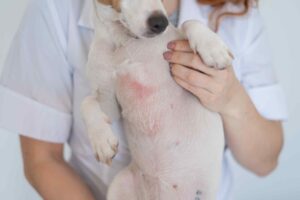Most of the microorganisms in the mammalian body reside in the intestinal tract, and various studies have revealed a close association between the gut microbiota (GM) and the health condition of the body. GM can support the maintenance of the intestinal mucus layer, secrete compounds that can suppress pathogens, and also plays a role in host metabolism through certain bacterial metabolites.
A balanced microbiota, therefore, is essential for the maintenance of the body’s homeostasis; even in dogs, gut microbial dysbiosis is associated with various problems, such as arthritis, inflammatory bowel disease, and metabolic disorders. GM health depends on various factors including diet, stress, and geographic location.
There are, to date, more than 400 dog breeds. Over time, heavy genetic modifications have led to this degree of heterogeneity within the canine species, and, depending on breed, dogs can differ profoundly in intelligence, body and head shape, and even lifespan. In addition, a link has been established between dog breed, susceptibility to certain gastrointestinal conditions, and variations in GM.
Age is one of the main factors inducing significant changes in the microbial communities of the microbiome. As we age, there is a decline in microbial diversity, which also affects cognition (association between gut-brain axis dysfunction and neurodegenerative disorders).
Several studies have also found a correlation between GM and BCS(Body Condition Score), with significant changes in the Firmicutes/Bacteriodetes ratio.
Canis lupus familiaris and gut microbiota: association with age, BCS, and breed
Given the possible relationships that exist between GM and dog breeds, age and BCS, it is essential to characterize the GM of dogs based on the characteristics of individuals.
To this end, the study by You et al., compared the GM of 96 healthy dogs according to breed, age and BCS, using microbial 16s rRNA gene sequence analysis.
The results of the study showed that the main microbial phyla present In the dogs analyzed were Firmicutes, Bacteroidetes, Fusobacteria, Proteobacteria e Actinobacteria.
When comparing dog breeds, the relative abundance of bacteria belonging to the genus Fusobacterium differed significantly according to the breed considered.
The abundance of bacteria Fusobacterium perfoetens was positively correlated with the age of the dogs, in fact these microorganisms were more present in the 6-10 year old group of animals (14.3%) than in the 0.5-1 year old group (7.2%).
In addition, despite the healthy appearance found in dogs in all age groups (0.5-10 years) and for different BCS values (3-6), the results showed that the gut microbial environment may be negatively altered in older dogs or dogs with abnormal BCS. For example, the authors found a lower abundance of Peptostreptococcus russellii species in dogs with ideal BCS (4-5). This species reduces the body’s ability to respond to intestinal damage. Therefore, in dogs with BCS in the normal range, a more favorable response and better recovery following damage to the intestinal tract is hypothesized.
Consolidation of scientific knowledge surrounding the gut microbiota
The study carried out by You and colleagues has made a significant contribution to the understanding of canine GM, highlighting how it can change in relation to variabilities among traits characteristic of the individual. “From our results,” the authors explain, “age is the most crucial factor driving the gut microbial community of dogs with respect to breed and body condition, particularly Fusobacterium perfoetens, which is much more abundant in the older group.” These findings can be used as a basis for improving quality of life by managing the gut microbiota of dogs and to promote healthieraging processes. In addition, the authors further enriched knowledge regarding the correlation between BCS and GM: maintaining an ideal BCS not only prevents disease, but can also inhibit the growth of pathogenic bacterial species.
Reference
You I, Kim MJ. Comparison of Gut Microbiota of 96 Healthy Dogs by Individual Traits: Breed, Age, and Body Condition Score. Animals (Basel). 2021 Aug 18;11(8):2432. doi: 10.3390/ani11082432.







